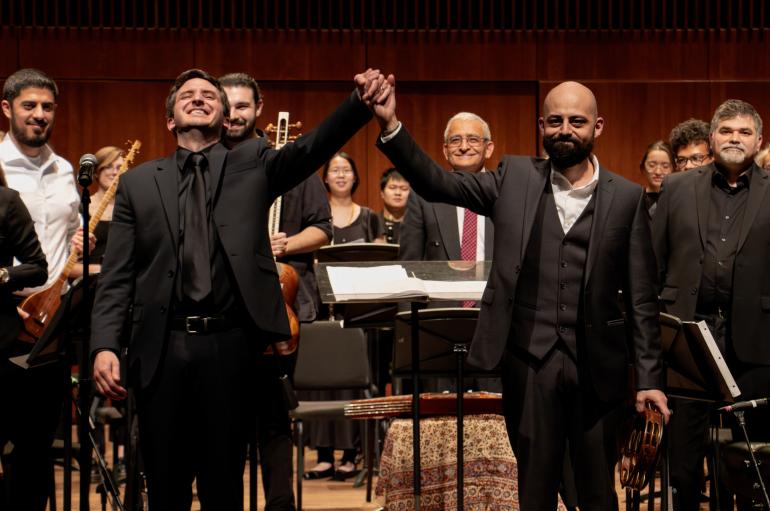
As we head into Fall 2024 auditions, we spoke with the directors of the Performance Program to learn more about their ensembles, musical interests, and hobbies.
Get to know each director with a brief Q&A below (updated weekly)!
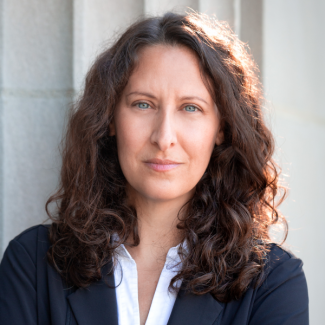
Mollie Stone - Choral Conductor and Lecturer
Share a recent favorite performance or rehearsal experience.
It's difficult to share a "favorite" experience, because so many moments stand out!
This past year, we had an incredibly powerful residency with Melanie DeMore, who worked with us on everything from African-American spirituals to her Gullah Geechee-inspired composition "Freedom Land." Other highlights in recent years include our first ever community lullaby concert, collaborations with the Middle Eastern Music Ensemble, and singing Brahms with the University Symphony Orchestra.
How would you describe a rehearsal for your ensemble?
We learn classical music from every time period, repertoire from polyphonic singing traditions around the world, and American music from a number of different genres. So each rehearsal, we delve into a wide range of vocal tones, learning styles, and historical background. One minute, we may be sight-reading Bach. Half an hour later, we're learning a highly-ornamented Corsican song from a piece of paper with number notation, or a Xhosa South African folk song with traditional dance movements. By the end, we're singing through an Appalachian ballad. All of these, we learn with the assistance of tradition-bearers, making connections with musicians around the world.
What is your favorite part of working with the ensemble?
I love the singers in my ensembles! I love that most of them are actually spending the majority of their lives doing non-musical things, but love music enough to carve a little time each week to come together to sing and be challenged and be a part of a community. What an extraordinary collection of people! Scientists, poets, mathematicians, social workers, astro-physicists, artists, lawyers, librarians—they're just the most amazing group of humans.
What are you doing musically outside of UChicago?
I spend a lot of time traveling to other countries to learn about their harmony-singing traditions, studying directly with culture bearers. I also work to bring those culture bearers to the U.S. and, through the organization Village Harmony, I work to bring groups of people from around the world to those countries to study and perform. I particularly love leading singing study trips in South Africa, The Republic of Georgia, Corsica, Bulgaria, and Sweden. I also serve as Co-Founder/Co-Director of the Chicago World Music Chorus.
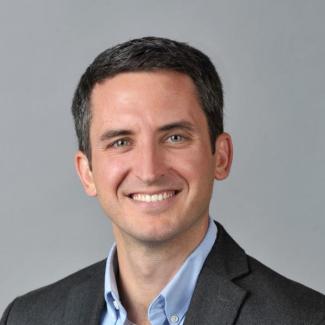
Matthew Sheppard - Chamber Orchestra
What three words would you use to describe your ensemble?
Music and learning. Or, if you don't count the "and," Joyful music and learning.
How would you describe a rehearsal for your ensemble or program?
Invigorating. Chamber Orchestra musicians are intensely focused and hard working at rehearsals, but ultimately, the joy and power of making music together with their peers gives back just as much energy as it requires. The spirit of collaboration, of high-level artistry, and of being both supported and pushed by those around you is infectious, and the feeling of accomplishment after 150 minutes is palpable.
What are you doing musically outside of UChicago?
Outside of UChicago, I serve as music director of the Danville Symphony Orchestra and the Hyde Park Youth Symphony, artistic director of the Elgin Youth Symphony Orchestras, and as a guest conductor and clinician across the Midwest for musicians of all types: students, educators, and professional performers.
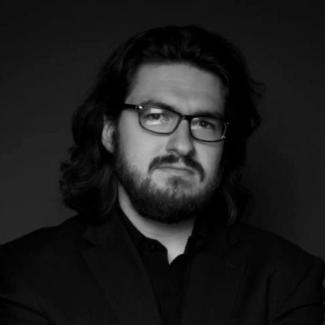
Samuel Werk - Afro-Cuban Folkloric Ensemble
What three words would you use to describe your ensemble?
Participatory, Engaging, Fun.
Share a recent favorite performance or rehearsal experience.
They are all my favorite! Each performance keeps getting better. I especially like seeing ensemble members leading the ensemble more and more.
What is your favorite part of working with the ensemble?
Sharing my love of Afro-Cuban culture.
Do you have any hobbies outside of music?
I play competitive shuffleboard.
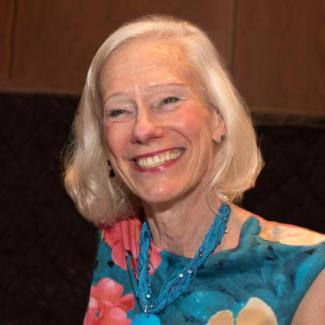
Barbara Schubert - University Symphony Orchestra + Performance Program Director
What three words would you use to describe your ensemble?
Ambitious, exhilarating, rewarding!
Share a recent favorite performance experience.
Two performances from last season stand out: our March performance of Richard Strauss’s Don Juan and our May performance of Prokofiev’s Fifth Symphony. The University Symphony presented both of these very challenging works with extraordinary passion and polish.
How would you describe a rehearsal for your ensemble?
Rehearsals are intense, since we cover a lot of music each quarter. I try to get the technical parameters under control early on, so we can devote subsequent rehearsals to honing details of balance, color, phrasing, articulation, and style, as well as the overall dramatic shape and emotional meaning of each piece of music.
What are you looking forward to in the 2024-25 academic year?
I’m looking forward to meeting all of the incoming orchestra musicians at the upcoming auditions, of course, and to exploring both familiar and unusual repertoire with the members of the University Symphony! Every season I try to introduce new and unusual pieces as well as some cornerstones of the repertoire, and address them with fresh insights. This year I’m particularly looking forward to our spring concert, which will include a collaboration with the University Chorus and Motet Choir on Kodaly’s magnificent Psalmus Hungaricus. Before that we have works by Debussy, Dvorak, Glazunov, Hindemith, Tchaikovsky, John Williams, and more.
What is your favorite part of working with the ensemble/program?
I truly appreciate the hard work and dedication of the musicians – as well as their remarkable talent and enthusiasm. I put a lot of music in front of the USO every season, and much of it is both technically and stylistically challenging. The USO players work hard to master all aspects of the repertoire, and then concentrate in performance to present polished, compelling, and inspiring concerts to our audience. Sharing in their joy and in their sense of accomplishment at the actual performance is an experience I treasure.
What are you doing musically outside of UChicago?
I also serve as Music Director and Conductor of the DuPage Symphony Orchestra in the western suburbs. Happily, we have quite a few alums of the University Symphony Orchestra who now play in the DuPage Symphony! I also conduct the Park Ridge Fine Arts Symphony, which is a professional summer festival orchestra. Each orchestra has a different personality, and that keeps me on my toes.
Do you have any hobbies outside of music?
I love to go hiking, mostly in Acadia National Park (in Maine), and I love traveling as well. Art and architecture are particular interests of mine, and I immerse myself in them in a variety of ways. Gardening is another favorite pastime that provides both solace and joy, as well as another outlet for creativity.
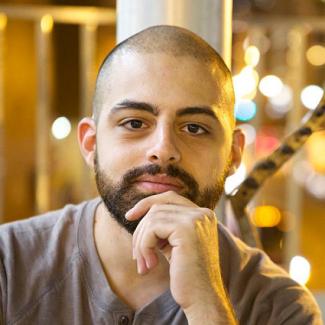
Wanees Zarour - Middle East Music Ensemble
What three words would you use to describe your ensemble?
Community, Impact, Authenticity.
How would you describe a rehearsal for your ensemble?
Rehearsals with MEME are akin to workshops. They are collective, hands-on learning sessions that help not only perform the material but understand and internalize its cultural and historical context. And they are super fun!
What are you doing musically outside of UChicago?
I tour with my own jazz septet, East Loop, which explores the intersections of jazz and Arabic music, bringing a lot of microtonal delight into the mix. I also co-direct the Chicago Immigrant Orchestra, a 14-piece ensemble comprised of some of Chicago’s esteemed bearers of global musical traditions and instrumentation.
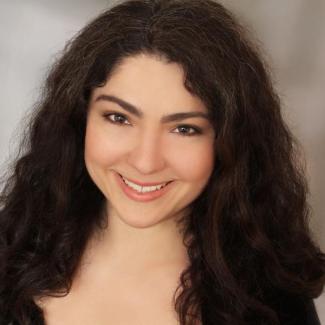
Heather Wittels - Chamber Music Program
What three words would you use to describe your program?
Collaborative, tailored, real-time.
How would you describe a rehearsal for your program?
My job as your coach is to help your group discover new sounds, phrases, and ways of working together as an ensemble. Our coachings help you rehearse more efficiently and effectively on your own, and guide the group towards more personal, specific and exciting performances. Coaching is part of the rehearsal and preparation process, not an end point in itself, so groups should rehearse and coach early and often throughout a quarter to make the overall experience more rewarding and leave enough time to use what you learn to better the performances.
What are you doing musically outside of UChicago?
I am a full-time member of the Lyric Opera of Chicago orchestra, in the first violins. If you come up to the pit wall before a performance there, you will see me warming up. I am also a dyed-in-the-wool opera nerd. When the opera is on hiatus, I often play with the Joffrey Ballet or as a substitute violinist with the Chicago Symphony. I perform with various small chamber music ensembles - often a piano trio - and mentor young violinists through Chicago Musical Pathways Initiatives. In the summers, I am the concertmaster of the orchestra at the AIMS Festival in Graz, Austria, where the orchestra spends 5-6 weeks rehearsing and performing both symphonic and operatic repertoire in various venues around Graz.
Do you have any hobbies outside of music?
I am an outdoor runner in all four seasons.
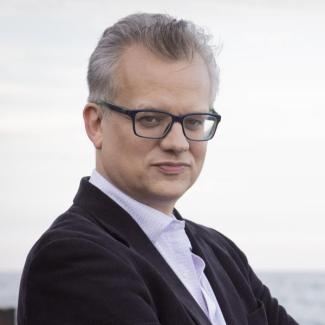
Michael Allemana - Jazz Ensemble
What three words would you use to describe your ensemble?
Collaborative, rigorous, fun
How would you describe a rehearsal for your ensemble or program?
First, we explore a tune, finding possibilities for arranged sections. We then work on playing as an ensemble. Next, we examine the solo form and contexts of a selected composition and discuss ways of expanding student improvisational skills for that selected composition.
What are you looking forward to in the 2024-25 academic year?
I look forward to meeting new student musicians. Also, it is always exciting to collaborate with students to arrange ensemble repertoire. We never know how a program is going to sound once a theme for that quarter's concert has been settled upon, so the process of developing arrangements is quite exciting and spontaneous.
What is your favorite part of working with the ensemble/program?
Learning students' strengths and helping them realize those strengths while working with them to develop new musical skills, all within the context of learning unfamiliar repertoire.
What are you doing musically outside of UChicago?
I perform often around the Chicago area at the various jazz venues (I always let students know where I am performing). Students can see me perform with the group Chicago Calling, led by saxophonist Juli Wood, Saturday, September 28th at the Hyde Park Jazz Festival at 5:30pm on the Midway.
Do you have any hobbies outside of music?
This summer I have become obsessed with gardening and with my wife Maria have cultivated a large vegetable and flower garden.
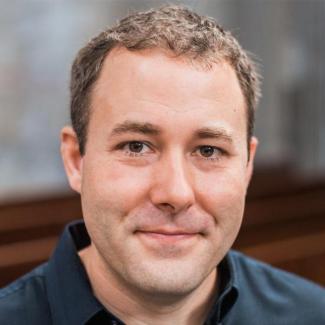
James Kallembach - Director of Choral Activities
Share a recent favorite performance experience.
Last year we gave a joint performance of Rachmaninoff Vespers with professional basso profundi Eric Alatorre, Mark Haddad, and Glenn Miller. Singers enjoyed the monumental challenge of learning one hour of sophisticated, profound, and sumptuous a cappella music in Russian (Church Slavonic, technically). They also enjoyed learning about the low basses and their notable careers in such ensembles as Chanticleer, Clarion Choir, and the Robert Shaw Chorale, among many others.
How would you describe a rehearsal for your ensembles?
In Motet Choir we spend a good deal of time learning how to sing Renaissance music, for example, and music of other periods, not just notes and rhythms. Many of the styles we sing in are less familiar to students, so we spend time learning about the music and style, not just putting concerts together. Doing this in a chamber setting with fewer singers is especially rewarding, as we learn how to sing together in a very nuanced and informed way.
In Chapel Choir we tend to read through music quickly, and perform a great deal of religious (and some secular) music of all periods, notably the Anglican/Episcopal repertoire, Renaissance music, music of Bach and his contemporaries, and music by living composers. There is much more emphasis on personal responsibility for musicality and musicianship. We perform more music per year than any other choir, if only by virtue of our weekly services in addition to Choral Evensongs and concert performances.
What are you doing musically outside of UChicago?
I am a composer that has written for Seraphic Fire, Lorelei Ensemble, the San Francisco Symphony (SoundBox series) and VocalEssence, among others; as well as for notable opera and recital singers and series. My opera on the Puritan exile Anne Hutchinson, entitled “American Jezebel” will premiere in March 2025 at Harvard University.
Do you have any hobbies outside of music?
I am an avid vegetable gardener and have been my whole life. I am a board (and card) game fanatic (no, really… a fanatic).
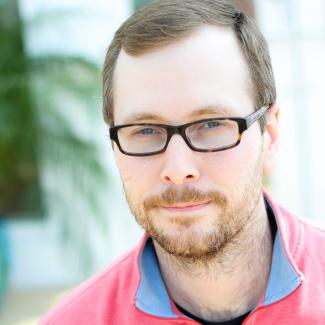
John Corkill - Percussion Ensemble
What three words would you use to describe your ensemble?
Collaborative, Creative, Visceral.
Share a recent favorite performance experience.
I still remember our performance from last winter. We did a whole program based on live electronics and intermedia. It was a huge undertaking for the students and myself as we were all learning the many ways to work microphones, mixers, and audio software. We did it in conjunction with the CHIME studio, and it was a really incredible moment to see how collaboration allows us all to learn and grow while amplifying our strengths we bring as individuals.
What is your favorite part of working with the ensemble?
What I love most about the Performance Program is the mutual love for music performance mixed with a highly driven community of students and faculty who are studying a wide range of academic disciplines. This creates a very rich and diverse ecosystem of people who can offer new insights and expand how we integrate our artistic practices within the university.
What are you doing musically outside of UChicago?
I have a not-for-profit I founded and help run called Beyond This Point. As a multidisciplinary ensemble, we explore the many intersections amongst the arts and sciences that focus on a post instrumental aesthetic. Another way to put it is that I am a reformed percussionist who really enjoys exploring the endless connections of gesture and movement to the sound that I am creating. I do many other things musically outside of the university as well, but Beyond This Point is something I have spent many years developing.
Do you have any hobbies outside of music?
I enjoy all culinary actives. My time spent away from music is trying out new recipes, learning new cooking techniques, or exploring different parts of Chicago’s culinary scene.
